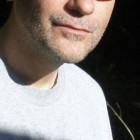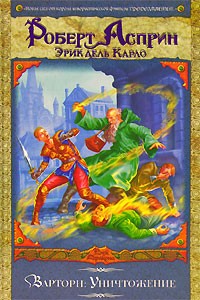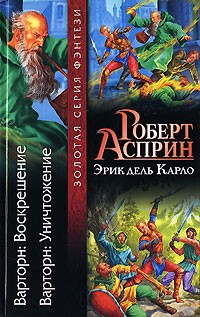
Эрик дель Карло — об авторе
Биография — Эрик дель Карло
I was born during the Vietnam War, in the city of San Francisco. I retain a gauzy childhood memory of the Watergate Trials interfering with my afternoon cartoon viewing. From early days I was enthralled by reading; no accident, this--we were a house of readers. Books everywhere. My mother read endless stories to me. My father, Victor, had an extensive collection of thrillers and science fiction, all those lurid book covers, that wonderful choking scent of paper and print in the house's basement. Did I read those books? Oh, yes, I did. And, of course, it wasn't much of a drastic leap from consuming all this fabulous fiction--and it was all fabulous to me, all of it--to wanting to…
create it myself.
I started selling short fiction to small press magazines in my early twenties. The stories were earnest, arguably a bit literarily overwrought, but were genuine expressions of the kind of emotional work I wanted to produce. I probably most enjoyed selling to late lamented Figment magazine, whose editors Barb and J. C. Hendee have gone on to a successful joint writing career. I was swinging blind with my work, writing absolutely whatever I felt like, following any mood or impulse. It was hit or miss, sale or rejection, but the sheer giddy joy of that process was very valuable to me.
I moved fairly often. Without any higher education or anything resembling marketable job skills, beyond a willingness to submit to bottom-rung clerking gigs, I was free to go wherever I liked. I lived in Santa Fe, New Mexico; twice in New Orleans; spent time in the U.K.'s London. I wrote throughout, but it hardly qualified as a career. During my second stint in New Orleans, living in the fabled French Quarter and again eking out a just-above-the-poverty-line existence, I met Robert Asprin. My soon to be wife, Samala Ray, brokered the encounter. Asprin frequented a few of the Quarter's overabundance of drinking establishments; Sam had bumped into him one night. I knew Asprin as a name writer of science fiction and fantasy, though I'd never read his work. Neither had I been to many conventions, and so had never come in contact with anyone famous in the field. Bob Asprin was--this is predictable, if you're familiar with his humorous fiction--a funny guy, with jokes aplenty to put anyone at ease who might be a bit starstruck to find himself sitting on a barstool adjacent to someone who had achieved fame when I was still banging out awkward disjointed fiction on a manual typewriter in grade school. A friendship formed, and collaboration loomed, and we produced two novels of non-humorous fantasy, the Wartorn books. When Bob died, my wife and I had long since fled New Orleans, getting out a day in front of Hurricane Katrina. I had only been back once, to retrieve what we'd left behind in our apartment. I saw Asprin then; and two and a half years later he was dead. I had gotten a chance to publish on a greater scale than I ever had before. I saw my own name rendered in Cyrillic on the covers of the Russian editions of the Wartorn novels. I will always be grateful to Robert Asprin for those experiences.
Now I live in California again, in wine country, in the quiet and predictability of a small town. I don't work day jobs anymore. I do what I've wanted to do since sometime around the age of seven: I write, I write, and I write; and the words do not stop.
Книги
Смотреть 2Библиография
After quite a bit of adolescent fumbling to put words together on paper so to create a coherent dramatic effect, I at last started to sell my science fiction, fantasy and horror to magazines, many now defunct in the way of small press publications. There was a breathless triumph that went with these first sales, a kind of runaway giddiness that has never quite been duplicated in my career.
After Hours
"Clown White" 1990
"Up Around the Bend" 1991
"Methusaleh Sips Coffee At Midnight" 1993
Figment
"Familiar" 1991
"Afterimage" 1992
"The Reprise" 1992
"From Out the Land of Nod" 1993
Pandora
"Pyre" 1993
Aberrations
"Gypsycab" 1995 -- nominated for the Theodore Sturgeon Memorial Award
"Infestation"…
Рецензии
Смотреть 35 июля 2016 г. 22:29
152
3.5 Ни разу не шедевр, но вполне съедобно.
Сколько же негативных отзывов на эту книгу - жуть. Особенно на первый роман дилогии. Тогда как, по-моему, главная беда в романе - обманутые ожидания. Вот как будто люди купили билет на кинокомедию, а им драму показали. Все вышли из кинозала и плюются - мол, совсем несмешные комедии стали снимать... Так и тут. Имя Асприна на обложке, имидж автора, сыграл злую шутку. Ведь перед нами не несмешное смешное фэнтези, а просто фэнтези. Самое обычное, никоим образом смешным не замышлявшееся. Из мозаики нескольких сюжетных линий выстраивается общая панорама событий. Это плюс. Множество персонажей, все интересные (хотя и несколько картонные, глубоко прописать ни одного человека авторы так и не смогли, даже ситуация с двумя разумами в одном теле раскрыта очень поверхностно). Кстати, да, вообще…
28 февраля 2020 г. 13:28
164
2 Все намного хуже...
Действительно, даже хуже первой книги! Такое ощущение, что Асприна тут нет от слова совсем! А кто этот Карло - никто и не знает. Погуглил - вообще не нашел каких-то еще его книг. Вообще, созданная в этих книгах вселенная, и ее законы, в угоду каким-то необходимым поворотам в повествовании - тут же перествавали работать. Это как? С мотивацией героев тоже беда. И бесили постоянные повторения автора, который наверное писал книгу для умственно отсталых, где он снова и снова говорит о тех же самых вещах, что были прописаны им в предыдущих главах. Не хотел бы советовать читать эту книгу, но все же посоветую!) Чтобы прочли и может мне рассказали - что я там не так все понял, а книги на самом деле шедевр фэнтези!!)



